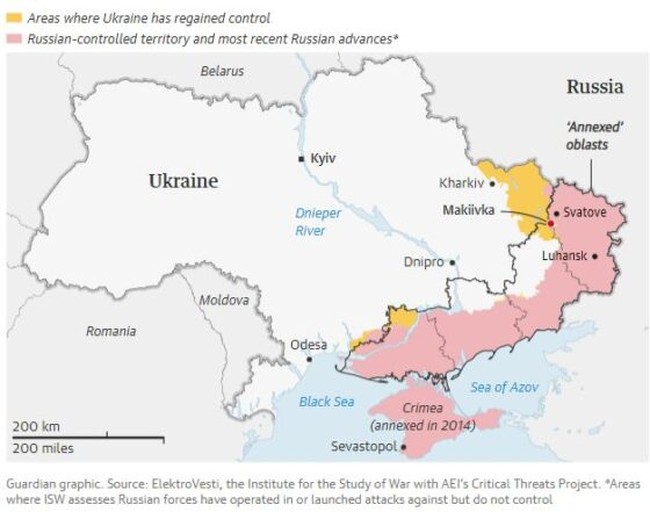Russian mobiks, as the newly mobilized recruits are called, have been complaining for weeks that they were sent to the front lines in Ukraine with no training and little to no equipment. As you would expect when troops with no discipline and no equipment are sent to the front lines, the results are not good. Over the last few days there have been reports that hundreds of mobiks sent to the front lines in they city of Makiyivka in eastern Ukraine were wiped out. Here’s a map created by the Guardian which show the location of Makiyivka:

The report about what happened there comes from a Russian news outlet called Verstka who spoke to one of the few survivors. He says that after being told they would be stationed miles from the front lines his battalion was suddenly taken to the front and told to hold the line.
Aleksey Agafonov, one of the surviving servicemen, told Verstka about the losses among those mobilized as a result of shelling on the line of contact near Makiivka in the Svatovsky district of the Luhansk region. According to him, the death toll could exceed 500 people…
The commander of the mobilized battalion, who were trained in military unit 2079, promised that the military would be brought to the Svatovo region, where they would join the ranks of the “territorial defense” 15 kilometers from the front line, Agafonov said. However, on the night of November 1-2, the entire battalion was brought to the line of contact and ordered to dig in and hold the line of defense.
According to Agafonov, once the shelling started the commanders ran, leaving their men behind to be picked off.
“We were dumped into the forest and ordered to entrench; we had only three shovels for the battalion, and there was no support at all. We entrenched as best we could, and in the morning the [Ukrainian] attack started. [Ukrainian forces used] artillery, Grad MLRS, mortars and copters; we were just shot.
When it all started, the officers immediately ran away. In between the attacks, we tried to entrench, but the copters immediately spotted us and just shot us. Out of 570 people, 29 managed to survive, 12 more were wounded, and the rest are all dead”.
Agafonov added that mobiks were on the front lines while Russian mercenaries and volunteers took positions behind them. He said that other battalions had been similarly destroyed in the same area and that the survivors had made their way to Svatove in groups of four or five men and were wandering around afraid to be sent back. “Many who survived are losing their minds after what happened,” he said. The story was confirmed by the wife of another survivor.
“He [my husband] called me in the morning from someone else’s number and told me what happened, that they were left to dig the defence line, came under mortar fire, and somehow managed to get from Krasnodon to Svatove, where they are hiding. They are now afraid to go anywhere, they are even afraid to go to the checkpoints. Their commanders abandoned them, and they do not know what to do, they are just calling for help,” Chernykh said.
Another mobiks wife said he and the men with him were “left like kittens” on the front lines with no officers to even give them direction.
Word of the disaster has made its way back to Russia. This and other similar disasters have prompted some pro-war bloggers to offer criticism of the military.
In another sign indicating poor morale and communications at the front, several pro-Kremlin journalists published an open letter reportedly from an elite Russian naval infantry unit that criticised its superiors’ decision-making after huge losses in what it called an “incomprehensible” assault on the village of Pavlivka.
Russian forces launched an offensive on Pavlivka, south-west of Donetsk, on 2 November, according to the Ukrainian military and pro-Russia officials. Four days later, the 155th Guards Naval Infantry Brigade reportedly accused its military leaders of the loss of 300 men in a letter to Oleg Kozhemyako, the governor of their home region in the far-east of Russia.
“We were thrown into an incomprehensible offensive,” the letter was quoted as saying by a number of prominent pro-war bloggers.
Authorities initially denied the letter was real but then changed course and responded to it, the first time an official response has been made to specific criticism of the war effort.
The governor, Kozhemyako, at first dismissed the letter as a “potential fake planted” by Ukrainians but later issued a video message saying he had contacted the officers on the front line who confirmed there had been heavy fighting and losses. However, he said, “the number is as not as high as it’s written in this letter.”
“Due to the competent actions of the commanders, the losses among the marines over this period do not exceed 1 percent of the combat personnel and 7 percent of the wounded, a significant part of whom have already returned to duty,” the Russian Defense Ministry said in its statement, issued on Monday…
…rather than mollify these critics, the statement only inflamed their anger by minimizing the extent of the losses.
“So far it looks like that the military, having noticed another impending wave of discontent, decided to quickly subcontract the authorities of the region to their side and marginalize the whole situation, once again pretending that nothing is happening,” wrote a popular blogger who writes under the moniker Military Informer. “We hope this situation will change.”
So the losses are bad enough that authorities feel the need to lie about them.
I’ll wrap this up with Julia Davis’ latest video from Kremlin controlled television. While Russian officers are busy running away, state propagandist keep upping their rhetoric to compensate. Here’s one of these stooges arguing for the use of nuclear weapons to panic the west enough that Joe Biden will be ordered to talk peace with Putin.
Meanwhile in Russia: husband of the head of RT Margarita Simonyan, Tigran Keosayan (a propagandist in his own right, albeit not nearly as popular as his wife), argues that nuclear threats/strikes are the way to go. He compares Russia to Tatar Mongols, arguing that might is right. pic.twitter.com/Q33axDvvua
— Julia Davis (@JuliaDavisNews) November 7, 2022








Join the conversation as a VIP Member